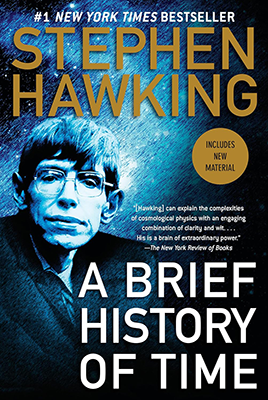A Brief History of Time
“A Brief History of Time” is a bestselling book by physicist Stephen Hawking, first published in 1988. It aims to provide an accessible overview of cosmology, exploring the universe’s origins, nature, and ultimate fate. Here’s a summary:
Main Themes:
The Universe and Its Origins: Hawking delves into the Big Bang theory, which proposes that the universe originated from a singular point of infinite density and temperature approximately 13.8 billion years ago. He discusses the implications of this theory for understanding the early moments of the universe’s existence.
Black Holes: Hawking explains the concept of black holes, regions of space where gravity is so strong that nothing, not even light, can escape. He explores the formation, properties, and behavior of black holes, as well as their role in shaping the universe.
The Nature of Time and Space: Hawking discusses the interconnectedness of space and time, as described by Albert Einstein’s theory of general relativity. He explores the concept of spacetime and its curvature by matter and energy, providing insights into the fundamental structure of the universe.
The Arrow of Time: Hawking examines the concept of time’s arrow, discussing how time flows in a particular direction from the past to the future. He explores the asymmetry of time, entropy, and the second law of thermodynamics, shedding light on the nature of temporal progression.
Key Concepts:
– Wormholes and Time Travel: Hawking explores the theoretical possibility of wormholes, hypothetical tunnels through spacetime that could potentially allow for shortcuts across vast distances or even time travel.
– Quantum Mechanics: While not the primary focus of the book, Hawking touches upon the principles of quantum mechanics and its implications for understanding the behavior of particles on the smallest scales.
– The Anthropic Principle: Hawking discusses the anthropic principle, which suggests that the laws of the universe must be compatible with the existence of observers. He explores the implications of this principle for cosmology and the search for a unified theory of physics.
Legacy:
“A Brief History of Time” is celebrated for its ability to distill complex scientific concepts into accessible language, making it a landmark work in popular science literature. It has inspired countless readers to contemplate the mysteries of the cosmos and sparked interest in the field of theoretical physics. Despite its publication over three decades ago, the book continues to captivate audiences and remains a timeless exploration of the universe’s wonders.

